Search the Special Collections and Archives Portal
Search Results

Transcript of interview with Michael Saltman by Barbara Tabach, December 16, 2014
Date
Archival Collection
Description
In this interview, Michael Saltman recounts his family background, his schooling in Michigan, and living abroad in London and Munich. His travels to Israel in 1968 reinforced his connection to Judaism. Saltman and his wife, Sonja, moved to Las Vegas in 1975 and he began working with Larry Larkin, who eventually became his partner. He discusses several projects he completed with Larkin, including shopping centers and apartment complexes. He talks about the changes in Las Vegas that came about from the availability of financing from legitimate sources, and the population growth of the area. He then talks about his involvement in the local Jewish community with the Jewish Federation, Anti-Defamation League and Congregation Ner Tamid.
In 1942, Michael Saltman, the son of a rugged Canadian entrepreneur and of an educator, was born in Flint, Michigan. Michael spent a fulfilling childhood in Flint, where his family was involved in the Jewish community, even helping start a new temple. However, his life changed dramatically when his father passed away during his teenage years. At his mother's insistence, Michael went to law school after graduating from Michigan State University, and received his Juris doctor from Wayne State University. From Detroit, Michael headed to London to participate in an LL.M. program, though he quickly withdrew and landed a position with a life insurance and investment company in London. Michael soon relocated to the company's Geneva office, where his job included establishing operations in Israel. It was during these trips that he more intensely connected with Judaism and his Jewish identity. Michael left the company to join a former colleague at Shareholders Capital Corporation, where he met his wife Sonja. The couple moved to Munich, where they lived until 1975, until moving to Las Vegas. In Las Vegas, Michael became a successful real estate developer. His projects include apartments, shopping centers and office parks, like Village Apartments, Campus Village Shopping Center and Renaissance Center. He later opened Food 4 Less grocery stores in Nevada, Utah and California, eventually buying the Kansas-based company from Lou Falley. He and his partner later sold the company to Kroger. Michael served on the local Jewish Federation's board of directors, and Sonja is a longtime board member for the Anti-Defamation League's regional office in Las Vegas. In 2003, Michael and Sonja co-founded the Saltman Center for Conflict Resolution within William S. Boyd School of Law. Michael's other efforts to promote peaceful conflict resolution include the production of Streetball Hafla, a movie shot in Israel about Jewish and Palestinian teenagers interacting in basketball camp.
Text

Transcript of interview with Adele Baratz by Steve McClenachan, March 3-4, 1979
Date
Archival Collection
Description
Interview with Adele Baratz by Steve McClenachan on March 3 and 4, 1979. In this interview, Baratz talks about growing up in Las Vegas and her her schooling. She graduated from Las Vegas High School in 1944, and discusses the rationing that took place during World War II. She went to Maryland for nursing school and returned to Las Vegas in 1947. She describes some of the hotels and casinos, and tells the story of her father trading property for an automobile in 1935. She also recalls the building of Hoover Dam, swimming in local pools, and going to Mount Charleston in the winter. The interviewer asks her about travel between Las Vegas and California and the impact of Atlantic City on Las Vegas tourism. Baratz then talks about her nursing career and starting a re-certification program in 1974 and the different hospitals in the area.
Text
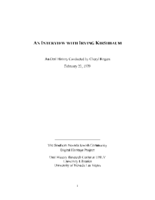
Transcript of interview with Irving Kirshbaum by Cheryl Rogers, February 23, 1979
Date
Archival Collection
Description
Interview with Irving Kirshbaum by Cheryl Rogers on February 23, 1979. In this interview, Kirshbaum discusses the Riviera Hotel where he began working in 1955. He also talks about the landscape of the Las Vegas Strip in the 1950s, and the state of gambling, comps, customer service, and dealer training. The interviewer asks about the treatment of minorities at the Riviera, and in Las Vegas generally, and the effect of corporate ownership on casinos.
Text
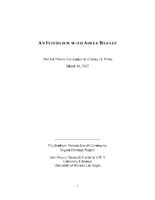
Transcript of interview with Adele Baratz by Claytee D. White, March 19, 2007
Date
Archival Collection
Description
Interview with Adele Baratz by Claytee White on March 19, 2007. In this interview, Baratz talks about her parents who came to the United States as teenagers from Russia and eventually settled in Las Vegas after a short time in California. She discusses the Jewish community in Las Vegas when she was growing up, and her father's job selling bootlegging supplies, then as a real estate broker, then as a bar owner. Baratz attended the Fifth Street Grammar School, which was built after a fire destroyed the original school, and Las Vegas High School. As a teenager, she worked at Nellis as a messenger and in the rations department, then went to nursing school in Baltimore at Sinai Hospital. She talks about her father's bar, "Al's Bar," that was popular with Union Pacific Railroad workers, and how the bar was forced out for the building of the Golden Nugget. Baratz recounts where her family lived, the growth of the Jewish community, and building the first synagogue on Carson Street.
Text
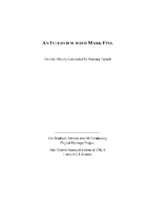
Transcript of interview with Mark Fine by Barbara Tabach, November 18 and December 2, 2014
Date
Archival Collection
Description
Interview with Mark Fine in two sessions, November 18 and December 2, 2014. In the first session, Fine begins by talking about his sons and their business interests, then discusses his own childhood growing up in Cleveland. Fine moved to Arizona as a teenager and attended the University of Arizona for college. After college, he moved to New York city, and describes his employment at Chemical Bank, and then at the investment firm Loeb, Rhoades. He was married and started a family in New York City, then moved to Las Vegas to assist in his in-laws' (the Greenspuns) business ventures, which included real estate development and Sun Outdoor Advertising. Fine talks about Las Vegas in the 1970s and building Green Valley and Summerlin, the "social engineering" aspects of developing a community and the importance of building incrementally. In Part II of the interview, Fine discusses his family history and raising his children in Las Vegas. He talks about the growth of the Jewish community and ph
Mark Fine was born in 1946 in Cleveland, Ohio, and was raised with a strong Jewish identity. When Mark was in fourth grade, his parents moved the family to Shaker Heights, and again moved to Arizona during his senior of high school. Upon graduation, Mark enrolled at the University of Arizona and became a member of the ZBT fraternity; determined to graduate in four years, he finished in 1964 with a degree in business administration with an emphasis in real estate. Though never having been, Mark took his degree to New York City and established a career on Wall Street, first working for Chemical Bank. In 1969, Mark married Susan Greenspun, and soon after, the couple had their first child. By this time, Mark had taken a new position with Loeb, Rhoades and Company, and worked there for nearly five years in their corporate finance department. In 1973, Mark moved to Las Vegas to assist his father-in-law, Hank Greenpun, with his nonnewspaper business operations, largely under the auspices of American Nevada Corporation. Mark soon capitalized on this passion for real estate and community development, leading several integrated real estate projects to create the Green Valley area, the city's first large-scale master-planned community. Mark went on to launch a similar project in Summerlin, and at one point, he was leading the development of the country's two fastest selling planned communities (Green Valley and Summerlin). Ultimately, Mark became one of state's prominent real estate developers, and continues to lead significant projects positively impacting the city's growth and appeal. His fundamental goal has always been to create a sense of place, to develop thriving communities with generational stamina. His success in this endeavor is recognized, in part, with the naming of Mark L. Fine Elementary School. Over the years, Mark has also been an important member of the Jewish community, among the "second generation of pioneers," coming after those heavily involved with the hotels during the 1950s and 1960s. He served on the Temple Beth Sholom board of directors, and initiated events to bring older and younger generations of the Jewish community together in meaningful ways. Mark has five children?Alyson Marmur, Katie Erhman, Jeffrey Fine and Jonathan Fine and Nicole Ruvo Falcone?and is married to Gloria Fine.
Text

Transcript of roundtable interview with the Holocaust Resource Center: Myra Berkovits, Susan Dubin and Doug Unger, by Barbara Tabach, September 4, 2014
Date
Archival Collection
Description
Interview with Myra Berkovits, Susan Dubin and Doug Unger of the Holocaust Resource Center. In this interview, the group discusses the beginnings of what is now the Sperling Kronberg Mack Holocaust Resource Center. Edythe Katz-Yarchever is discussed as the catalyst for establishing the center and getting others involved with the Governor's Advisory Council on Education Relating to the Holocaust. Berkovits talks about her role as a liason for Holocaust education in the Clark County School District and the student-teacher conferences held each year with funding from Sheldon Adelson. Unger discusses expanding the outreach to the Washoe County School District with assistance from Atlantis Hotel (Reno, Nev.) owner, John Farahi and Judy Mack. They talk about the previous locations of the Holocaust Resource Center on Maryland Parkway, then Renaissance Drive, and the affiliation with the Jewish Federation and the Jewish Family Service Agency. After funding and personnel issues around 2011, the advisory council and the library went through a re-structuring and hired Susan Dubin who organized and catalogued the library collection. The library is now accredited by the Association of Jewish Libraries.
Text
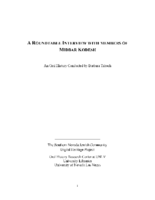
Transcript of roundtable interview with members of Midbar Kodesh, April 19, 2015
Date
Archival Collection
Description
In this interview, members of Midbar Kodesh discuss how they each became involved in the synagogue, and how the congregation formed in the mid-1990s. Some of the narrators grew up in Las Vegas and talk about the growth of the town and being former members of Temple Beth Sholom.
Text
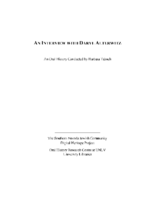
Transcript of interview with Daryl Alterwitz by Barbara Tabach, November 8, 2014
Date
Archival Collection
Description
Interview transcript with Daryl Alterwitz by Barbara Tabach on November 8, 2014. In this interview Daryl Alterwitz, son of Deanne and Oscar Alterwitz, recalls moving to Las Vegas from Gary, Indiana, for his parents' pursuits in the furniture business. He speaks about his schooling at Valley High School, his friendship with Robert Engel, and attending University of California Santa Cruz, and taking a leave of absence to travel through Asia. Alterwitz became more involved in Judaism after his bar mitzvah, and has continued his religious affiliation throughout his adult life, and has traveled to Israel twice. He talks about meeting his former wife, his travels through Europe, and coming back to Las Vegas after some time in Reno.
In 1959, Daryl Alterwitz was born in Gary, Indiana, son of Oscar and Deanne Alterwitz. When he was thirteen years old, his family moved to Las Vegas to capitalize on new opportunities in the growing city, and his parents purchased Walker Furniture soon after their arrival. As a high school student, Daryl experienced a powerful trip to Israel, which strengthened his connection to Judaism. After graduation from Valley High School, Daryl attended the University of California - Santa Cruz, and after two years of study, Daryl took time off to travel throughout South Asia, accompanied by close childhood friend Robert Engel. He returned after a year and graduated with an independent major in classical studies. From there, Daryl spent more time in Israel living on a kibbutz. Daryl next went to law school at Santa Clara University, and then supplemented his education with a degree in taxation from New York University School of Law. Between law school and New York, he met his wife, Teri Shoofey; they two had two children, though are now divorced. After New York, he returned to Nevada, first living in Reno. After his father passed away, Daryl moved back to Las Vegas, and took on more responsibility with the family business as well as practicing law. Daryl?s commitment to community service is enduring and visible. He has donated his time and resources to both Jewish organizations, like Jewish Family Services, and non-Jewish groups, like Las Vegas Rescue Mission. He has also served on the boards of the Jewish Federation, Congregation Ner Tamid, and the Anti-Defamation League. Daryl also continues to indulge his passion for international travel, having visited Morocco, Egypt, Turkey, Cambodia, and has even biked from Hungary to Poland.
Text
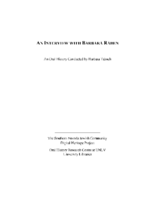
Transcript of interview with Barbara Raben by Barbara Tabach, February 24, 2015
Date
Archival Collection
Description
Interview with Barbara Raben by Barbara Tabach on February 24, 2015. In the first part of the interview Raben discusses her involvement with Hadassah in Southern Nevada, and the various groups within that organization. During the second part of the interview, she talks about her family and her relationship to Judaism, and moving to Las Vegas in 1991. Raben discusses the business she built in Los Angeles and Las Vegas called the Candy Factory. She then talks about the formation of Midbar Kodesh with other families from Temple Beth Sholom. Raben continues to be involved in the Jewish community and the Jewish Family Service Agency.
In 1945, Barbara Raben was born to Kermit and Adele Shulman, children of Eastern European emigrants. She enjoyed a happy childhood in Stamford, Connecticut, and was raised with a strong Jewish identity. After attending college in New Jersey, Barbara married Richard Grisar, and the couple lived in London for a year, before returning to Stamford. In 1975, Barbara and Richard moved to Los Angeles where Barbara owned and operated a very successful candy business, Candy Factory. Sixteen years later, Barbara sold her business, and the family relocated permanently to Las Vegas, where her husband owned radio stations. Barbara has always been an active member of the Jewish community, wherever she lived, giving her time to synagogue, children's day school and service organizations. Upon arriving in Las Vegas, Barbara and her family were members of Temple Beth Sholom, before leaving the congregation to start Midbar Kodesh Temple with a small group of other families. She has been an active member of Hadassah Southern Nevada Chapter for over a decade, helping rebuild the organization locally after participating in the Hadassah Leadership Academy, a program designed to engage a younger generation of members. Currently, Barbara serves as board president and interim executive director for Jewish Family Service. In 2004, then a widow, she married Terry Raben. Barbara has four sons with her first husband: Michael, Andrew, David and Marc Grisar.
Text

Transcript of interview with Henry Kronberg by Barbara Tabach, February 26, 2015 and April 13, 2015
Date
Archival Collection
Description
Interview with Henry Kronberg by Barbara Tabach in two sessions, February 26 and April 13, 2015. In the first session Kronberg talks about his childhood in Germany and Poland and his experience being imprisoned by the Gestapo, and transported to a concentration camp. He survived the Holocaust and met his wife, and they moved to the United States in 1946. He discusses being reunited with his sister in Las Vegas after decades of searching, and moved his family to Las Vegas in 1962. Kronberg talks about becoming involved with Jewish life here, and his wife, Lillian's involvement at Temple Beth Sholom. In the second session, Kronberg discusses purchasing Stoney's, a loan and pawn shop, including some of the clientele and merchandise. He also discusses other social and environmental concerns like anti-Semitism and water resources in Southern Nevada.
Henry Kronberg was born in 1920 and spent his early childhood in a town on the border of Poland and Germany, about 40 miles from Krakow. For years he felt uncomfortable telling his story of surviving the Nazi concentration camps of World War II. Today his name is linked to the Sperling Kronberg Mack Holocaust Resource Center in Las Vegas. And in his soft-spoken manner, Henry recalls his ordeal of loss of family and survival during this most heinous of situations through backbreaking labor and ingenuity. At the end of the war, Henry met the love of his life, Lillian, also a survivor. The two married in 1946 in Frankfurt and immigrated to New Jersey where she had relatives. He describes their difficulties and the various jobs he held until becoming an excellent baker. Then in 1962 an interesting choice took him to a bar mitzvah in Canada. While there the dinner conversation lead him to a great discovery?his sister Lala had survived and was living in Las Vegas. Soon he moved his wife and daughter to Las Vegas. His first foray into business was with his brother-in-law. However, soon it was important to be independent and to control his own destiny. He purchased a going concern, Stoney's Pawn Shop, from Dr. Alexander Coblentz, one of the city's first doctors. He became the fourth owner of Stoney's and operated it until selling it to Steven Mack in 1998. Henry and his wife were active in the Jewish community. They joined Temple Beth Sholom and became fast friends with many of the early leaders of Las Vegas and became a respected member of the secular and Jewish communities.
Text
